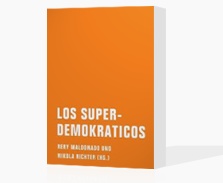Strange thing, modernity. I get in touch with my best friend and work colleague more by Facebook than with my natural and talented speech abilities. Therefore, my fingers are supplanting my clumsy lips, and each day my tongue is getting expendable, when we talk about communicating in this digital era. I keep my words more and more hidden in the darkness. And this is a paradox for a social communicator, and even worse when we consider that my friend’s desk is just a meter away from mine.
Did I already tell you, that my work colleague is called Juan? He loves ch’utas (an eccentric urban-rural rhythm, with origin in La Paz, and danced in its streets at Carnival). Through Social Media, Juan has found supporters in distant places like the Czech Republic. Those gringos ask him constantly to upload carnival videos to the website , in which ch’utas music groups as Juventud Súper Elegantes y sus Lindas Mamitas, or the Papitos Choleros (womanizers) y sus Lindas Bellezas Tipo Holandesas. Anyway, he says that his Czech friends have promised him to go to Bolivia in 2011 to dance ch’utas at Carnival’s beginning. I can’t imagine which name are they going to use for their music group.
Jorge is trying to convince me to join one of his internet Austral Whales Sanctuary safeguard groups, there are whales still being killed. “Where’s that?”, I ask him. “No idea”, he answers. Jorge has absolutely no idea where that sanctuary is. He doesn’t even know the sea, but it doesn’t matter. He keeps sending messages to the whole world as “Let the whales live!”, “Long life to the Austral Whales Sanctuary!”.
Those are the advantages of being a part of this contemporary globalism. A society’s cultural expressions, its weaknesses and knowledge, its concerns and happiness are not just its property, are also adopted by other societies. Borders are getting more obsolete each day.
Massive, standardized messages are received at the same time by different people in different places around the world. The more technologically communicated we are, the less communicated we really are. For example, it’s a paradox that all the writers I try to interview for my newspaper do prefer to receive the questions by E-mail rather than to sit in a café and just talk. Then, annotations have no taste at all. They’re not that bad, but you could feel it: no human contact there.
One of today’s global dictatorships is the Internet. If you’re not on Facebook, you’re not part at all of this global neighbourhood. An unconnected person (no social networks, no E-mail) is a pariah, a Mr Nobody without identity in this cyber civilization. The more electronic devices filling our pockets, the better. No matter if they’re useless to us. And mobile phones? Has anybody ever thought how many brilliant minds have been working just to make possible that tiny thing with a tiny screen? What for? To send a text, most of the times. Or just to submit sentences that are unable to form a decent paragraph: “Where are you?” “Getting there”. “Wait for me, wait for me”. We’ll give it a better use, won’t we?
Translation: Ralph del Valle


 Themen
Themen



